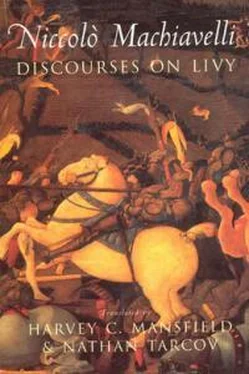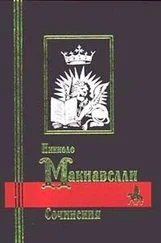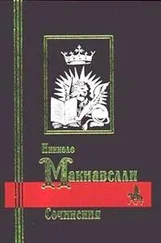Николо Макиавелли - Discourses on Livy
Здесь есть возможность читать онлайн «Николо Макиавелли - Discourses on Livy» весь текст электронной книги совершенно бесплатно (целиком полную версию без сокращений). В некоторых случаях можно слушать аудио, скачать через торрент в формате fb2 и присутствует краткое содержание. Год выпуска: 2014, Издательство: epubBooks Classics, Жанр: История, Философия, на английском языке. Описание произведения, (предисловие) а так же отзывы посетителей доступны на портале библиотеки ЛибКат.
- Название:Discourses on Livy
- Автор:
- Издательство:epubBooks Classics
- Жанр:
- Год:2014
- ISBN:нет данных
- Рейтинг книги:5 / 5. Голосов: 1
-
Избранное:Добавить в избранное
- Отзывы:
-
Ваша оценка:
- 100
- 1
- 2
- 3
- 4
- 5
Discourses on Livy: краткое содержание, описание и аннотация
Предлагаем к чтению аннотацию, описание, краткое содержание или предисловие (зависит от того, что написал сам автор книги «Discourses on Livy»). Если вы не нашли необходимую информацию о книге — напишите в комментариях, мы постараемся отыскать её.
Discourses on Livy — читать онлайн бесплатно полную книгу (весь текст) целиком
Ниже представлен текст книги, разбитый по страницам. Система сохранения места последней прочитанной страницы, позволяет с удобством читать онлайн бесплатно книгу «Discourses on Livy», без необходимости каждый раз заново искать на чём Вы остановились. Поставьте закладку, и сможете в любой момент перейти на страницу, на которой закончили чтение.
Интервал:
Закладка:
In support of what has been said above, I might cite innumerable instances, as of Moses, Lycurgus, Solon, and other founders of kingdoms and commonwealths, who, from the full powers given them, were enabled to shape their laws to the public advantage; but passing over these examples, as of common notoriety, I take one, not indeed so famous, but which merits the attention of all who desire to frame wise laws. Agis, King of Sparta, desiring to bring back his countrymen to those limits within which the laws of Lycurgus had held them, because he thought that, from having somewhat deviated from them, his city had lost much of its ancient virtue and, consequently much of its strength and power, was, at the very outset of his attempts, slain by the Spartan Ephori, as one who sought to make himself a tyrant. But Cleomenes coming after him in the kingdom, and, on reading the notes and writings which he found of Agis wherein his designs and intentions were explained, being stirred by the same desire, perceived that he could not confer this benefit on his country unless he obtained sole power. For he saw that the ambition of others made it impossible for him to do what was useful for many against the will of a few. Wherefore, finding fit occasion, he caused the Ephori and all others likely to throw obstacles in his way, to be put to death; after which, he completely renewed the laws of Lycurgus. And the result of his measures would have been to give fresh life to Sparta, and to gain for himself a renown not inferior to that of Lycurgus, had it not been for the power of the Macedonians and the weakness of the other Greek States. For while engaged with these reforms, he was attacked by the Macedonians, and being by himself no match for them, and having none to whom he could turn for help, he was overpowered; and his plans, though wise and praiseworthy, were never brought to perfection.
All which circumstances considered, I conclude that he who gives new institutions to a State must stand alone; and that for the deaths of Remus and Tatius, Romulus is to be excused rather than blamed.
Chapter X
That in Proportion as the Founder of a Kingdom or Commonwealth Merits Praise, He Who Founds a Tyranny Deserves Blame.
Of all who are praised they are praised the most, who are the authors and founders of religions. After whom come the founders of kingdoms and commonwealths. Next to these, they have the greatest name who as commanders of armies have added to their own dominions or those of their country. After these, again, are ranked men of letters, who being of various shades of merit are celebrated each in his degree. To all others, whose number is infinite, is ascribed that measure of praise to which his profession or occupation entitles him. And, conversely, all who contribute to the overthrow of religion, or to the ruin of kingdoms and commonwealths, all who are foes to letters and to the arts which confer honour and benefit on the human race (among whom I reckon the impious, the cruel, the ignorant, the indolent, the base and the worthless), are held in infamy and detestation.
No one, whether he be wise or foolish, bad or good, if asked to choose between these two kinds of men, will ever be found to withhold praise from what deserves praise, or blame from what is to be blamed. And yet almost all, deceived by a false good and a false glory, allow themselves either ignorantly or wilfully to follow in the footsteps such as deserve blame rather than praise; and, have it in their power to establish, to their lasting renown, a commonwealth or kingdom, turn aside to create a tyranny without a thought how much they thereby lose in name, fame, security, tranquility, and peace of mind; and in name how much infamy, scorn, danger, and disquiet they are? But were they to read history, and turn to profit the lessons of the past, it seems impossible that those living in a republic as private citizens, should not prefer their native city, to play the part of Scipio rather of Cæsar; or that those who by good fortune or merit have risen to be rulers, should not seek rather to resemble Agesilaus, Timoleon, and Dion, than to Nabis, Phalaris and Dionysius; since they would see how the latter are loaded with infamy, while the former have been extolled beyond bounds. They would see, too, how Timoleon and others like him, had as great authority in their country as Dionysius or Phalaris in theirs, while enjoying far greater security. Nor let any one finding Cæsar celebrated by a crowd of writers, be misled by his glory; for those who praise him have been corrupted by good fortune, and overawed by the greatness of that empire which, being governed in his name, would not suffer any to speak their minds openly concerning him. But let him who desires to know how historians would have written of Cæsar had they been free to declare their thoughts mark what they say of Catiline, than whom Cæsar is more hateful, in proportion as he who does is more to be condemned than he who only desires to do evil. Let him see also what praises they lavish upon Brutus, because being unable, out of respect for his power, to reproach Cæsar, they magnify his enemy. And if he who has become prince in any State will but reflect, how, after Rome was made an empire, far greater praise was earned those emperors who lived within the laws, and worthily, than by those who lived in the contrary way, he will see that Titus, Nerva, Trajan, Hadrian, Antoninus and Marcus had no need of prætorian cohorts, or of countless legions to guard them, but were defended by their own good lives, the good–will of their subjects, and the attachment of the senate. In like manner he will perceive in the case of Caligula, Nero, Vitellius, and ever so many more of those evil emperors, that all the armies of the east and of the west were of no avail to protect them from the enemies whom their bad and depraved lives raised up against them. And were the history of these emperors rightly studied, it would be a sufficient lesson to any prince how to distinguish the paths which lead to honour and safety from those which end in shame and insecurity. For of the twenty–six emperors from Cæsar to Maximinus, sixteen came to a violent, ten only to a natural death; and though one or two of those who died by violence may have been good princes, as Galba or Pertinax, they met their fate in consequence of that corruption which their predecessors had left behind in the army. And if among those who died a natural death, there be found some bad emperors, like Severus, it is to be ascribed to their signal good fortune and to their great abilities, advantages seldom found united in the same man. From the study this history we may also learn how a good government is to be established; for while all the emperors who succeeded to the throne by birth, except Titus, were bad, all were good who succeeded by adoption; as in the case of the five from Nerva to Marcus. But so soon as the empire fell once more to the heirs by birth, its ruin recommenced.
Let a prince therefore look to that period which extends from Nerva to Marcus, and contrast it with that which went before and that which came after, and then let him say in which of them he would wish to have been born or to have reigned. For during these times in which good men governed, he will see the prince secure in the midst of happy subjects, and the whole world filled with peace and justice. He will find the senate maintaining its authority, the magistrates enjoying their honours, rich citizens their wealth, rank and merit held in respect, ease and content everywhere prevailing, rancour, licence corruption and ambition everywhere quenched, and that golden age restored in which every one might hold and support what opinions he pleased. He will see, in short, the world triumphing, the sovereign honoured and revered, the people animated with love, and rejoicing in their security. But should he turn to examine the times of the other emperors, he will find them wasted by battles, torn by seditions, cruel alike in war and peace; many princes perishing by the sword; many wars foreign and domestic; Italy overwhelmed with unheard–of disasters; her towns destroyed and plundered; Rome burned; the Capitol razed to the ground by Roman citizens; the ancient temples desolated; the ceremonies of religion corrupted; the cities rank with adultery; the seas covered with exiles and the islands polluted with blood. He will see outrage follow outrage; rank, riches, honours, and, above all, virtue imputed as mortal crimes; informers rewarded; slaves bribed to betray their masters, freedmen their patrons, and those who were without enemies brought to destruction by their friends; and then he will know the true nature of the debt which Rome, Italy, and the world owe to Cæsar; and if he possess a spark of human feeling, will turn from the example of those evil times, and kindle with a consuming passion to imitate those which were good.
Читать дальшеИнтервал:
Закладка:
Похожие книги на «Discourses on Livy»
Представляем Вашему вниманию похожие книги на «Discourses on Livy» списком для выбора. Мы отобрали схожую по названию и смыслу литературу в надежде предоставить читателям больше вариантов отыскать новые, интересные, ещё непрочитанные произведения.
Обсуждение, отзывы о книге «Discourses on Livy» и просто собственные мнения читателей. Оставьте ваши комментарии, напишите, что Вы думаете о произведении, его смысле или главных героях. Укажите что конкретно понравилось, а что нет, и почему Вы так считаете.











